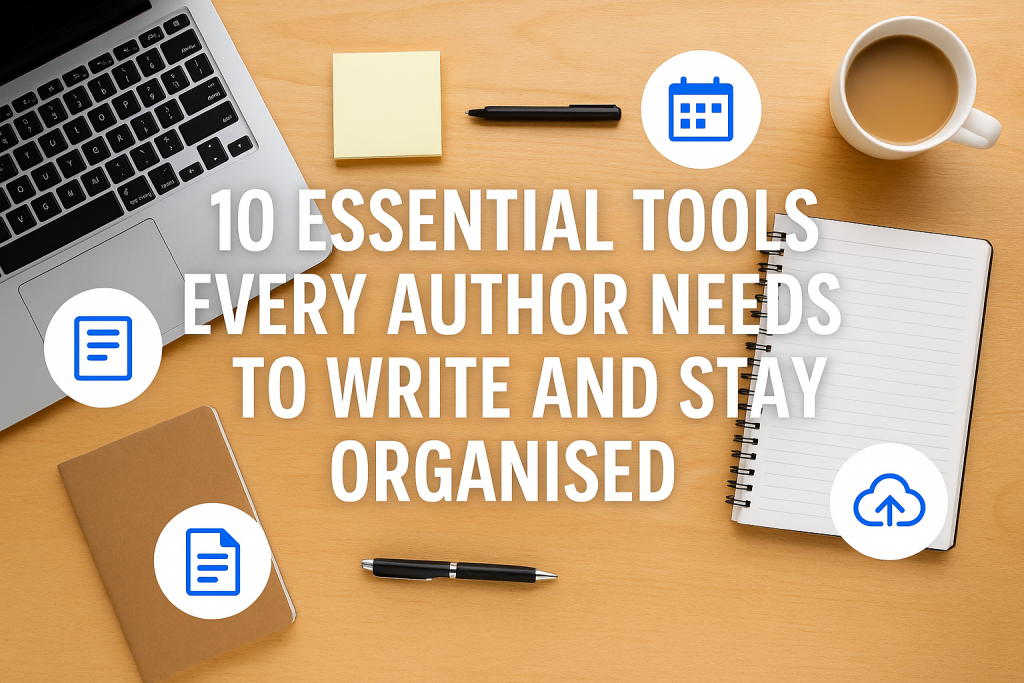Writing a book isn’t just about creativity and caffeine—it’s about having the right tools to turn your ideas into a finished, polished manuscript. Whether you’re just starting out or looking to improve your workflow, these 10 essential tools will help you write smarter, stay focused, and keep everything in order.
Let’s dive in.
🧠 1. Scrivener – The Ultimate Writing Studio
If you’re juggling chapters, research, outlines, and drafts, Scrivener is a game changer. It’s built for long-form writing, letting you break your manuscript into manageable parts and rearrange them with ease. You can also store research, character notes, and timelines all in one place.
Best for: Fiction and nonfiction authors who need structure and flexibility.
📄 2. Google Docs – Simple and Shareable
Need a free, cloud-based writing platform that autosaves your work and allows real-time collaboration? Google Docs is perfect for drafting on the go and sharing with editors or beta readers.
Best for: Authors who write on multiple devices or collaborate with others.
📊 3. Trello – Organise Your Writing Life
Trello helps you manage your writing projects visually. Use it to outline your novel, plan marketing tasks, track publishing goals, or create a social media schedule. Its drag-and-drop boards make project management feel less overwhelming.
Best for: Staying on top of tasks and deadlines.
⏱ 4. Pomofocus – Beat Distractions
The Pomodoro Technique breaks your work into 25-minute focused sessions with short breaks in between. Pomofocus is a simple online timer that keeps you productive without burning out.
Best for: Writers who struggle with distractions or procrastination.
🧾 5. ProWritingAid or Grammarly – Self-Editing Made Easy
These editing tools help you clean up grammar, fix awkward sentences, and identify repetitive phrases. While they don’t replace a professional editor, they’re great for early drafts.
Best for: Catching common errors before handing your manuscript over to an editor.
🔒 6. Dropbox or Google Drive – Backup Your Work
Always back up your writing! Cloud storage tools like Dropbox or Google Drive automatically sync your files and keep your work safe from accidental loss.
Best for: Safe storage and accessing your work across devices.
📚 7. BookFunnel – Share Your eBooks Like a Pro
Whether you’re sending out ARCs (Advanced Reader Copies) or giving away a free reader magnet to grow your email list, BookFunnel makes delivery smooth and stress-free for both you and your readers.
Best for: List building, promotions, and ARC distribution.
🎨 8. Canva – Design Without the Headache
Need to create a book cover, social media graphic, or quote image? Canva offers easy-to-use templates and design tools perfect for non-designers.
Best for: Creating professional visuals for your books and promotions.
📧 9. MailerLite – Your Email List Lifeline
Building an email list is crucial for long-term success. MailerLite is user-friendly, affordable, and powerful enough for authors at any stage. You can set up automations, segment your audience, and send beautiful newsletters.
Best for: Growing and engaging your reader base.
🔍 10. Publisher Rocket – Find the Right Keywords
If you’re self-publishing, discoverability on Amazon is key. Publisher Rocket helps you find profitable keywords and categories for your books so readers can actually find them.
Best for: Boosting book visibility on Amazon and improving rankings.
Final Thought
You don’t need to use all 10 tools right away—start with what solves your most immediate challenge. Whether it’s staying focused, organising your ideas, or reaching readers, there’s a tool that can make your author life easier.
Investing in the right tools isn’t about spending money—it’s about saving time, reducing stress, and writing more books your readers will love.

